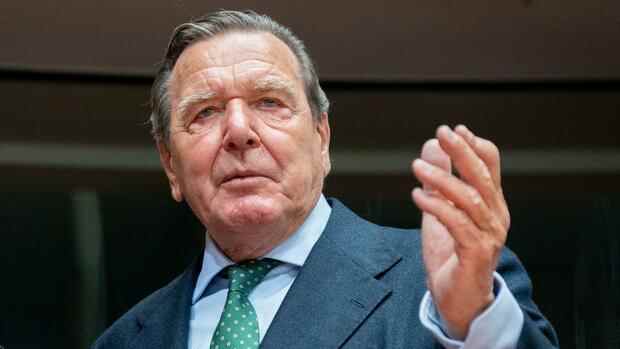Berlin The SPD leadership has sharpened the tone of the former Chancellor Gerhard Schröder and suggested that he leave the party. Resigning from his mandates with Russian corporations “would have been necessary to save his reputation as a former and once successful chancellor. And unfortunately he didn’t follow this advice,” party leader Saskia Esken said on Deutschlandfunk on Monday.
“Gerhard Schröder has been acting purely as a businessman for many years, and we should stop perceiving him as an elder statesman, as a former chancellor. He earns his living working for Russian state companies, and his defense of Vladimir Putin against war crimes charges is downright absurd.” Asked whether Schröder should resign from the party, Esken said: “He should.”
The party has been under massive criticism for its alleged closeness to Russia in recent decades, which has increased noticeably after Schröder’s interview with the New York Times. In it he had campaigned for maintaining relations with Russia despite the war of aggression against Ukraine.
He also made it clear that he did not want to renounce Russian President Vladimir Putin or his posts. Schröder is the head of the supervisory board at the Russian state energy giant Rosneft and most recently also worked for the pipeline companies Nord Stream 1 and Nord Stream 2.
Top jobs of the day
Find the best jobs now and
be notified by email.
Esken and her co-chairman Lars Klingbeil wrote to him at the end of February asking him to resign from his position at the state-owned company. The answer they demanded “promptly” does not yet exist.
Sarrazin exclusion lasted ten years
At the same time, the SPD leadership refers to a party order procedure, the outcome of which is open and which is usually lengthy. By last Sunday, 14 applications had been received, as the SPD district in Hanover announced on Monday when asked by the dpa. Among them were SPD local associations and district associations from several federal states, such as Baden-Württemberg, North Rhine-Westphalia and Lower Saxony.
Accordingly, an arbitration commission is responsible for these proceedings, in whose region the relevant party member is resident. The SPD district of Hanover did not initially say when a decision on a possible party exclusion could be expected.
>> Read more: Schröder receives 407,000 euros for his former chancellor’s office – the CSU considers this unacceptable
This can decide to exclude a party or at least limit Schröder’s membership rights. If Schröder objects, the case may have to be decided by the arbitral tribunal of the federal party. The exclusion of former SPD member Thilo Sarrazin showed how long the process can take.
Ten years passed before the party got rid of Sarrazin after two failed regulatory procedures. The third attempt – initiated by Klingbeil, then Secretary General of the SPD – lasted more than a year and a half and finally succeeded in 2020.
Pressure on the SPD comes in particular from the Union. The North Rhine-Westphalian Prime Minister Hendrik Wüst (CDU) said on Sunday to the “Bild” that Schröder’s interview was “quite disturbing, and there must be consequences.” The entire SPD leadership said: If Gerhard Schröder to his well-paid mandates with Putin, he can no longer be a member of the SPD.
Now he says that’s exactly what he intends to do. “That’s why the SPD is now called upon to put their words into action,” demanded Wüst. Kiev Mayor Vitali Klitschko told the newspaper that Schröder’s accounts should be considered if he continued in his post.
Federal Prosecutor General Peter Frank is not currently planning to question the former Chancellor as a witness in order to make progress in the structural investigation of war crimes in Ukraine. “Criminal proceedings are not a show event,” said Frank on Monday at a round of talks of the CDU/CSU parliamentary group. Frank explained that he currently does not believe that Schröder should testify as a witness to war crimes or as a witness about them. “We are not going into this field. That would not be serious.”
The legal policy spokesman for the Union faction, Günter Krings (CDU), had previously asked whether there were more opportunities to “shed light on the darkness” and in this way to hear Schröder as a witness. Uttam Das from the CDU Baden-Württemberg added: “Why is Mr. Schröder inclined in a newspaper report to protect Mr. Putin and to say that he did not give any orders.”
That raises questions. If there is a chain of command, how high does it go? This referred to the “history” of aggressive wars: “The environment in Obersalzberg could certainly have provided one or the other information about the war criminal at the time and what he knew or didn’t know.”
More: Dispute over arms deliveries: The pressure from the Union welds the traffic lights closer together.
